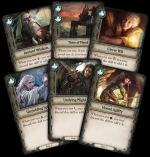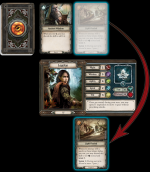Jacob Lewis
Ye Olde GM
Please refrain from making posts or comments in this thread. There is an ongoing journal with a lot of information, but it is going to take me a long time to write it. If you like, I have created a separate discussion thread that you can find it by following this link. Please direct any comments, questions, etc., there. Thank you.
There has been a lot of discussions about 4th edition D&D recently, and it's got me thinking about my own design ideas once again. I don't usually share them, mostly because its always a work in progress. Frankly, I know that it won't get a lot of support because it is radically different than what people want or expect. Everyone has their own ideas and opinions, so it just seems like a waste of time for me to share my own personal ideas for such a divisive community. But I've decided to give it a shot anyway. I'm only getting older, and I don't want my ideas to remain a secret. Somebody might find it useful, or maybe inspirational. We'll never know if I don't put it out there.
So I've been working on these ideas in my head for several years now. Its not complete, and I haven't figured out everything. But it has reached a point where I'm starting to see the bigger picture. I have a lot of information to share now that should give serious readers a better understanding of what I have in mind. But it's going to take me a long time to write down everything, and then organize it. And while I suspect many readers won't sit through a lot of thorough and lengthy posts, it was never intended for an audience with short attention spans and a lack of patience.
The simple answer is that I love D&D, and I loved fourth edition the best. I'm not saying it was perfect... none of them are, really... but there was more that I liked about it than any other version to date. And I could see that it had a lot more potential if so many things had happened differently. If somebody tried to go further than they did. If they didn't walk back so hard to try and appease the older fans. If... if... if...
If someone could just see what I see.
This is what this excursion is really about. I see a way to do something different and wonder why nobody else ever sees it? More importantly, how can I explain it? I'm over 50 now, and my problems with writing and staying focused have only gotten worse. It takes me hours to write a post. And often, I'll go back and revise my writing because I lost my focus along the way, or I'll forget what I wrote, or the point I was making. And sometimes I'll slip in a snarky comment without realizing it and need to fix it. Let me tell you, getting old is not for the timid.
Still, I want to put this out there. These are just ideas of how I would evolve the 4th Edition D&D game, to make it better for the way I would want to play it. Even if nothing comes of it, I can point others to it as an example of what I would do and how would I approach such things. The simple matter is that there are no meaningful changes you can make to a system without potentially upsetting the balance or integrity of how it all work. If its only a minor alteration, then it's really just a house rule that leaves the game largely intact.
What I have in mind is evolution.
There has been a lot of discussions about 4th edition D&D recently, and it's got me thinking about my own design ideas once again. I don't usually share them, mostly because its always a work in progress. Frankly, I know that it won't get a lot of support because it is radically different than what people want or expect. Everyone has their own ideas and opinions, so it just seems like a waste of time for me to share my own personal ideas for such a divisive community. But I've decided to give it a shot anyway. I'm only getting older, and I don't want my ideas to remain a secret. Somebody might find it useful, or maybe inspirational. We'll never know if I don't put it out there.
So I've been working on these ideas in my head for several years now. Its not complete, and I haven't figured out everything. But it has reached a point where I'm starting to see the bigger picture. I have a lot of information to share now that should give serious readers a better understanding of what I have in mind. But it's going to take me a long time to write down everything, and then organize it. And while I suspect many readers won't sit through a lot of thorough and lengthy posts, it was never intended for an audience with short attention spans and a lack of patience.
Defining My Goals
I think its important to clearly state what my goals are (and aren't) for this project so that others won't make incorrect or false assumptions. My goals are not necessarily the same as everyone else's, so keep that in mind if you intend to have a discussion with me.- I am not making a "retroclone". I'm not trying to recreate a faithful duplicate or adaptation of the original 4th Edition game. If I wanted to play a game like 4th Edition, then I would just play 4th Edition. I have most of the books and materials I need to create and run countless campaigns and adventures without needing the extra work.
- I am not creating another Open Game License (OGL). Despite recent discussions regarding licenses and gaining a better understanding of how they work, I am neither qualified nor inclined to create a new OGL just to work around the useless 4e GSL. There are others more talented and dedicated working on that already. Go bug them about what you want.
- It doesn't need to be backwards compatible. This kinda goes with my first point. If I thought the game was perfect, why would I want to spend this much effort reinventing the same game? Likewise, if I wanted to use my old books and materials, I'd just play the game as it is. Believe it or not, its still playable and fun as written.
- It doesn't need to be D&D. Fourth Edition took a lot of flack for not being "D&D" (or "D&D enough") because they changed a lot of the familiar assumptions and ditched a bunch of "sacred cows". But it is those differences and deviations that attracted me to the game. The fact that they tried to keep some of those fan-friendly elements is what kept the game from becoming much better. Compromising ideas in order to satiate norms and expectations is the quickest route to mediocrity.
- I don't intend to publish or make money. I need to be clear about this because a lot of people automatically assume that is the goal of everyone who does work like this. Everything is measured in dollars and cents, which is horrible IMO. I do this because it is my hobby and my passion. That doesn't mean I'm any good at it, nor do I want to be judged for doing what I love. I'm doing this because I want to see it done right by my standards and my expectations.
The simple answer is that I love D&D, and I loved fourth edition the best. I'm not saying it was perfect... none of them are, really... but there was more that I liked about it than any other version to date. And I could see that it had a lot more potential if so many things had happened differently. If somebody tried to go further than they did. If they didn't walk back so hard to try and appease the older fans. If... if... if...
If someone could just see what I see.
This is what this excursion is really about. I see a way to do something different and wonder why nobody else ever sees it? More importantly, how can I explain it? I'm over 50 now, and my problems with writing and staying focused have only gotten worse. It takes me hours to write a post. And often, I'll go back and revise my writing because I lost my focus along the way, or I'll forget what I wrote, or the point I was making. And sometimes I'll slip in a snarky comment without realizing it and need to fix it. Let me tell you, getting old is not for the timid.
Still, I want to put this out there. These are just ideas of how I would evolve the 4th Edition D&D game, to make it better for the way I would want to play it. Even if nothing comes of it, I can point others to it as an example of what I would do and how would I approach such things. The simple matter is that there are no meaningful changes you can make to a system without potentially upsetting the balance or integrity of how it all work. If its only a minor alteration, then it's really just a house rule that leaves the game largely intact.
What I have in mind is evolution.
Last edited:






